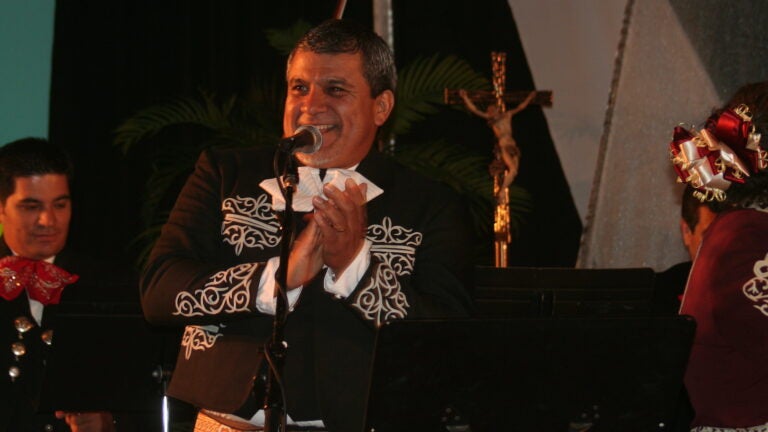
Photo courtesy of Pedro Rubalcava
Pedro Rubalcava: A Life of Music and Faith
Pedro Rubalcava found refuge under an altar.
For a 12-year-old growing up alongside eight siblings, the small space was a place of faith, peace and inspiration.
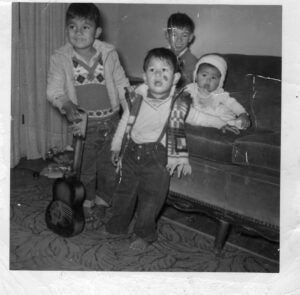
Hand-crafted by his father from two large doors, the wooden altar stood in the living room of his family’s small house in Brawley, a rural farming town near California’s borders with Mexico and Arizona. The pastor of the local Catholic parish, Our Lady of Perpetual Help, visited the house each week to celebrate Mass with the family and other immigrant farm laborers from across the Imperial Valley.
“Our living room was the parish church,” Rubalcava said. “This is where I fell in love with liturgy and the music that went along with it.”
Today, Rubalcava is a Grammy-nominated musician, composer and performer who has served as a director of Catholic liturgical music groups for more than 40 years.
Rubalcava is a participant in Guadalupe – At the Break of Dawn, the groundbreaking collaborative academic project from the Institute for Advanced Catholic Studies at USC and the T. Marie Chilton Chair in Catholic Theology at Loyola Marymount University. Guadalupe — At the Break of Dawn brings together world-class scholars and artists from across the globe to examine the cultural and artistic impact of Our Lady of Guadalupe from new perspectives.
In April 2021, as part of the project’s online launch event, he was a featured panelist in the webinar “Living Faith: Canto, Popular Religiosity, Encounter.”
Sacred Space
Originally from Jalisco, Mexico, Rubalcava’s father worked long days as a farm laborer and heavy machine operator. At home, he helped nurture his young son’s passion for music, buying him an AM radio as a Christmas gift and encouraging his interest in guitar.
“There was always music around us,” Rubalcava said. “I remember as a young boy learning to whistle from watching my dad. I began to whistle melodies incessantly — they all just came from my heart.”
As a child, Rubalcava was exposed to a variety of music — from the mariachi and ranchera ballads beloved by his parents and the 60s pop songs spinning on vinyl LPs at his cousin’s house to the country and western music playing on Brawley’s AM radio station.
He also looked to nature for inspiration, finding melody and rhythm in God’s creation.
“I’ve always had an ability to recognize a song in the natural world around me, whether it be in the wind, the song of the bird or leaves rustling,” he said. “I’ve always been able to listen, pick out unique sounds and craft them into music.”
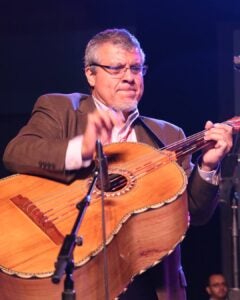
His family members were deeply devout Catholics, hosting Mass once a week in their home and praying the rosary together. Rubalcava found that music and his faith were always closely connected.
“There was always an attraction for me to music, not just for the sake of music but for the sake of prayer,” he added. “Early on, I knew I wanted music to be a major part of my life.”
With five brothers and three sisters, Rubalcava’s childhood home was busy and loud. So he’d sit under the altar, using the space as a sanctuary where he could escape the noise to do his homework, read scripture and strum his guitar.
“It was my space to be alone,” he said.
Music Ministry
Rubalcava turned his childhood love of music into a lifelong passion for pastoral ministry. After high school, he considered becoming a priest and attended St. Francis Seminary in San Diego. But he changed course after a year and a half, deciding to pursue a twin career as a musician and pastoral minister. He began working as a minister and music director at a parish in San Diego and, later, earned a bachelor’s degree in theology from San Diego University.
“Working in pastoral ministry really helped me dig deeper into my prayer life and my own spirituality,” he said. “I was constantly reading, not only to grow in knowledge, but also to deepen my own growth as a disciple and a committed Christian.”
Working in pastoral ministry really helped me dig deeper into my prayer life and my own spirituality.”
As he gained experience as a minister, he began developing leadership skills and mentoring younger Catholics, especially those who came from immigrant families as he did.
“One of the things I recognized growing up was that I was very introverted,” he said. “By the very nature of leadership, you grow out of that. So I learned to listen deeply. That’s a quality I will forever try to improve on. The ability to listen deeply and to teach young people to find quiet times in their lives is a gift.”
For more than three decades, Rubalcava has been working in professional pastoral ministry in various areas, including liturgy and music, evangelization, youth and young adult ministry, catechetical ministry and RCIA.
His pastoral work has coincided with a successful career as a musician, composer and performer. Rubalcava received national recognition in 1990 when Amanecer, his bilingual music collection, was nominated for a Grammy award in the Best Mexican/American Performance category.
His music is often centered on the Bible.
“Scripture influences me, especially the Psalms,” he said. “They have a sound and a rhythm. In some cases, they sing themselves. Beautiful melodies form around the words.”
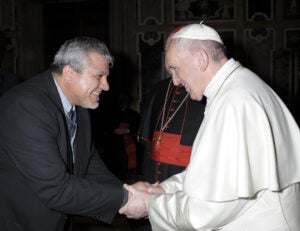
Rubalcava is currently the director of Music Development for Oregon Catholic Press, where he has worked the past 20 years. He also serves on the executive boards of the Instituto Nacional Hispano de Liturgia and the Northwest Regional Office for Hispanic Affairs. He lives with his wife, Kristin, in Damascus, Oregon. They have a son, Daniel José, and daughter, Emily Cecilia.
The Future Church
A child of immigrant parents, Rubalcava believes Latino Catholics have an important role to serve in the Catholic Church.
“Because of the sheer numbers and their age, young people have a unique opportunity to be leaders for the whole church, not just the Latino church,” he said. “There are many opportunities for Latino Catholics, especially at the local parish level.”
Young people have a unique opportunity to be leaders for the whole church.”
He encourages young Catholics to become involved in their local parishes and find mentors who can help them grow in their spiritual and professional journeys.
“I’ve had mentors throughout my life that I’ve learned from,” he said. “I consider myself fortunate to have been encouraged by so many people along the way.”
Rubalcava said the COVID-19 Pandemic and a society that is becoming increasingly secular poses challenges – and opportunities – for the Catholic Church.
“We need to make an effort to embrace humanity in unique ways that allow us to be Catholic,” he said. “People are still searching. They may not go to church as often, but they haven’t stopped being believers. Based on my experience, I know there’s opportunities for pastors and pastoral leaders to engage on a personal level and allow people the space to question their faith and ask questions about who they are as Latino Catholics in the U.S.”
“These are questions that are very important to raising up good disciples,” he added.
Artist Q&A: Pedro Rubalcava
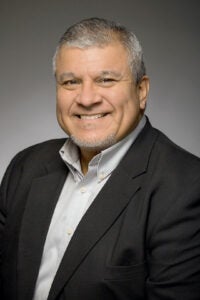
IACS: What musicians and artists do you look up to and admire?
Pedro Rubalcava: “My parents exposed me to a lot of regional Mexican music, including mariachi and ranchera music by Pedro Infante and Trío Los Panchos — this music is romantic and festive and was what I grew up with. When I was 9 years old, my father gave me an AM transistor radio as a Christmas gift. After school I’d come home, grab my radio and go for a bike ride in the countryside and try to pick up a signal. It was the 1960s and I’d listen to the pop music that was playing on the radio — Bob Dylan, the Rolling Stones and the Beatles.
In high school, I got more into singer-songwriters, like Dan Fogelberg, and Latin American pop music, like Roberto Carlos.
Later, I discovered jazz and more eclectic styles. I’ve always loved Classical music, like Mozart, Bach, Beethoven and Paganini. I also have an affinity for Gregorian chant.”
What is your favorite piece of music?
“Beethoven’s Symphony No. 8. All the movements are amazingly beautiful. The first time I heard it I cried. It’s a powerful piece of music that speaks to so many emotions.”
What is your favorite instrument?
“The guitar is mostly what I end up playing and the instrument I know the most about. But there are also times when I sit down at the piano — I love the resonance and different sounds it makes. I also love percussion, if you came to my house and saw my collection of drums, tambourines and shakers, you’d think I was a percussionist.”
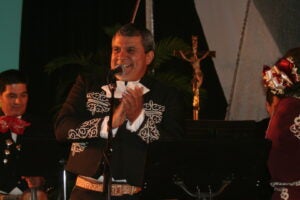
What is your favorite Bible verse?
“I love the image of the Baptism of Jesus in Matthew 3:17, with the voice of God saying:
‘This is my beloved Son, with whom I am well pleased.’
I’ve often imagined throughout my life God has spoken the same words to me over and over again.
I also love the Psalms, specifically Psalms 63 ‘Joy in the Fellowship of God’ and Psalm 51 ‘A Prayer of Repentance.’”
What is the best piece of advice you’ve received?
“I always received good advice from my dad throughout my life, especially when I was entering my teens and growing into young adulthood. He would see there was certain amount of fame associated with being a musician. So he’d say to me:
‘Don’t squander your gift by being too proud. Always be humble.’”
Listen to Rubalcava’s albums “Misa del Sagrado Corazón” and “Deo Gratias”